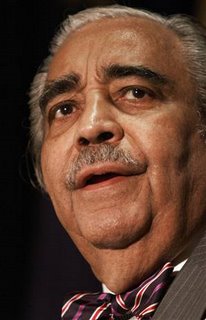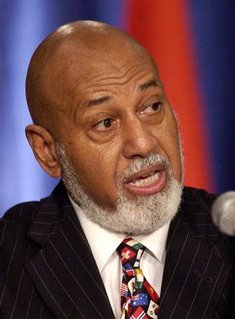The House will be in order. Bet that
When the new Congress takes over on January 3, people will be dropping the H-word, and rightly so. For African American voters more recently inclined to think the Democrats had taken them for granted, the outcome of the Nov. 7 vote has lifted some of their number to lofty, Historic political heights, solidified with darker faces the emergence of the Democrats as Congress' dominant force.
At or near the top of the new brain trust taking charge on Jan. 3 is South Carolina Rep. James Clyburn, who becomes the Majority Whip in the House of Representatives, only the second African American to ever reach that high a decision-making position in the House. Clyburn was elected unanimously by his fellow Democrats to take on the position of Herder of Cats. Feral cats, at that.
 "My job is going to be to try to round up 218 votes out of a very diverse caucus," Clyburn told the Charleston Post and Courier. For Clyburn, who follows Rep. Wiliam Gray of Pennsylvania, majority whip during the 1990s, seeking bipartisanship won't be a problem. "Negotiating across party lines is nothing new to me," he told the Post-Courier. "I have relationships across the aisle. I play golf with mostly Republicans."
"My job is going to be to try to round up 218 votes out of a very diverse caucus," Clyburn told the Charleston Post and Courier. For Clyburn, who follows Rep. Wiliam Gray of Pennsylvania, majority whip during the 1990s, seeking bipartisanship won't be a problem. "Negotiating across party lines is nothing new to me," he told the Post-Courier. "I have relationships across the aisle. I play golf with mostly Republicans."
Black congressmen and women in pivotal positions probably won't end there. The House should prepare for governance by black lawmakers wielding perhaps unprecedented leverage on the Hill:
Rep. Alcee Hastings of Florida is angling to head the House Intelligence Committee;
John Conyers of Michigan is the likely chairman of the Judiciary Committee;
Charlie Rangel of New York is the odds-on favorite to helm the Ways and Means Committee;
Bennie Thompson of Mississippi is expected to chair the Homeland Security Committee;
 Juanita Millender-McDonald, representing California, is the likely chair of House Administration, which oversees federal elections.
Juanita Millender-McDonald, representing California, is the likely chair of House Administration, which oversees federal elections.
Members of the Congressional Black Caucus may head no fewer than five House committees and 17 subcommittees.
For one longtime observer of minority trends in American politics, it's about time.
“Within the Congress, their influence went from about a one to a nine,” said David Bositis, of the Joint Center for Economic Studies, a minority-focused think tank in Washington.
“This is by far the peak — ever — for the Congressional Black Caucus,” Bositis told Erin Texeira of the Associated Press.
There will be challenges dead ahead. Hastings, a fiery congressman, was charged in an FBI bribery sting and acquitted by a federal jury -- none of which stopped him from later being impeached by the House and removed from the bench in 1989 by the Senate.
 Hastings' rise to House intel chief would be a comeback of Nixonian proportions; count on the Democrats (especially Jane Harman, the once-presumptive heir to the title) to fight him tooth and nail.
Hastings' rise to House intel chief would be a comeback of Nixonian proportions; count on the Democrats (especially Jane Harman, the once-presumptive heir to the title) to fight him tooth and nail.
House Speaker-elect Nancy Pelosi has apparently already told Harman she won’t be named to lead the committee, so the potential for dissension within the ranks is already high.
Therein lies the potential for the sort of sniping and infighting that the Democrats have raised to a high art. Witness the veiled bare knuckles used in the battle between John Murtha and Steny Hoyer for the post of Majority Leader.
But past isn't necessarily prologue. With African Americans at the helm of significant committees with impact on the lives of Americans, legislation central to many locked-out lives -- from issues of law enforcement and fairness in elections to hate crime legislation and appropriations -- has at least a chance. It makes for a new year, and a new Congress, to look forward to. It's not panacea; it's possibility, and there's nothin' wrong with that.
At or near the top of the new brain trust taking charge on Jan. 3 is South Carolina Rep. James Clyburn, who becomes the Majority Whip in the House of Representatives, only the second African American to ever reach that high a decision-making position in the House. Clyburn was elected unanimously by his fellow Democrats to take on the position of Herder of Cats. Feral cats, at that.
 "My job is going to be to try to round up 218 votes out of a very diverse caucus," Clyburn told the Charleston Post and Courier. For Clyburn, who follows Rep. Wiliam Gray of Pennsylvania, majority whip during the 1990s, seeking bipartisanship won't be a problem. "Negotiating across party lines is nothing new to me," he told the Post-Courier. "I have relationships across the aisle. I play golf with mostly Republicans."
"My job is going to be to try to round up 218 votes out of a very diverse caucus," Clyburn told the Charleston Post and Courier. For Clyburn, who follows Rep. Wiliam Gray of Pennsylvania, majority whip during the 1990s, seeking bipartisanship won't be a problem. "Negotiating across party lines is nothing new to me," he told the Post-Courier. "I have relationships across the aisle. I play golf with mostly Republicans."Black congressmen and women in pivotal positions probably won't end there. The House should prepare for governance by black lawmakers wielding perhaps unprecedented leverage on the Hill:
Rep. Alcee Hastings of Florida is angling to head the House Intelligence Committee;
John Conyers of Michigan is the likely chairman of the Judiciary Committee;
Charlie Rangel of New York is the odds-on favorite to helm the Ways and Means Committee;
Bennie Thompson of Mississippi is expected to chair the Homeland Security Committee;
 Juanita Millender-McDonald, representing California, is the likely chair of House Administration, which oversees federal elections.
Juanita Millender-McDonald, representing California, is the likely chair of House Administration, which oversees federal elections.Members of the Congressional Black Caucus may head no fewer than five House committees and 17 subcommittees.
For one longtime observer of minority trends in American politics, it's about time.
“Within the Congress, their influence went from about a one to a nine,” said David Bositis, of the Joint Center for Economic Studies, a minority-focused think tank in Washington.
“This is by far the peak — ever — for the Congressional Black Caucus,” Bositis told Erin Texeira of the Associated Press.
There will be challenges dead ahead. Hastings, a fiery congressman, was charged in an FBI bribery sting and acquitted by a federal jury -- none of which stopped him from later being impeached by the House and removed from the bench in 1989 by the Senate.
 Hastings' rise to House intel chief would be a comeback of Nixonian proportions; count on the Democrats (especially Jane Harman, the once-presumptive heir to the title) to fight him tooth and nail.
Hastings' rise to House intel chief would be a comeback of Nixonian proportions; count on the Democrats (especially Jane Harman, the once-presumptive heir to the title) to fight him tooth and nail.House Speaker-elect Nancy Pelosi has apparently already told Harman she won’t be named to lead the committee, so the potential for dissension within the ranks is already high.
Therein lies the potential for the sort of sniping and infighting that the Democrats have raised to a high art. Witness the veiled bare knuckles used in the battle between John Murtha and Steny Hoyer for the post of Majority Leader.
But past isn't necessarily prologue. With African Americans at the helm of significant committees with impact on the lives of Americans, legislation central to many locked-out lives -- from issues of law enforcement and fairness in elections to hate crime legislation and appropriations -- has at least a chance. It makes for a new year, and a new Congress, to look forward to. It's not panacea; it's possibility, and there's nothin' wrong with that.
.png)

Comments
Post a Comment